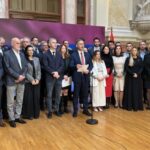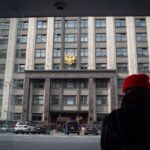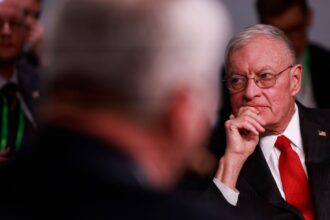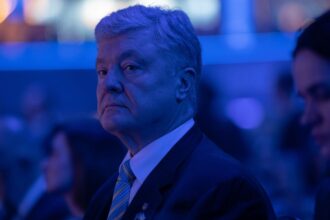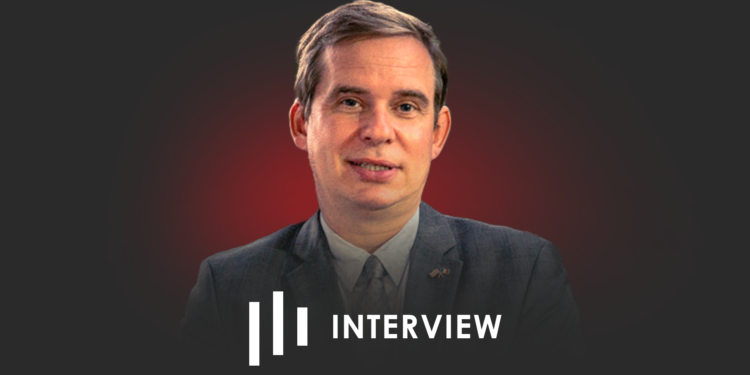In a few short weeks, Georgia’s fate will be decided.
GEORGIA TODAY spoke with Diego Colas, the Ambassador of France in Georgia and representative of the country that is currently the President of the EU Council.
Emanuel Macron, the French president, said that “Russia should not be humiliated despite Putin‘s historical mistake.” Do you find this statement to be humiliating for Georgians or Ukrainians?
I don’t believe so, because I think that it must be seen within the context of a policy of strong support for Ukraine. France’s policy has been to provide very strong support, both in terms military equipment and in terms sanctions, since the beginning this unjustified, unspeakable aggression by Russia against Ukraine. France, as President of the EU Council was instrumental in reaching agreement on six packages that were taken. These packages went far beyond any previous sanctions packages. France was also instrumental in aiding Ukraine to make a case for the crimes committed that will stand up in a court. We have a French expert in Ukraine helping Ukraine to make these cases and helping the Ukrainian Prosecutor Service perform their work.
Watch!
Georgia is also included in the list of those humiliated and vilified by Russia.
2008 was a year of war. It was a terrible moment for Georgians. We are well aware of this. We tried to find a political solution and bring peace after the war. It was a concerted effort to help Georgia recover the maximum amount of territory and maintain as much peace as is possible in order to maintain its pro Western route. This was the goal, and it was mostly achieved. I am aware of the frustration that has existed since 2008 over the Russians’ failure to fulfill these six points and the challenges it creates. We support Georgia on this issue. Regarding the policy towards Ukraine, and the statements of Macron, I believe that the best approach is to support Ukraine strongly. Be careful with maximalist rhetoric, but support Ukraine strongly.
Last year, President Macron awarded the French Order of the Legion of Honor to Bidzina, the former Prime Minister of Georgia. Isn’t that awkward to see the EU parliament calling for sanctions against him?
The award you mention was given due to the solid support the Cartu Foundation provided in Georgia, namely to the French School here and the Franco-Georgian University. This is a significant step forward. The policy we currently have is very different from a policy of sanctions against the leadership of Georgia. Currently, our policy is one of strong support for Georgia. It’s a strategy that is translated in Visa-Free Circulation, in ambition for the Association Agreement. Only a few countries possess this policy. We see no reason to change our policy of strong support for Georgia.
You are right in highlighting the concerns that I and the European Union have publicly expressed about the state of press freedom. There are many ways to address these concerns. I don’t think that changing the relationship with Georgia from one of support towards more confrontational would be the best way to ensure and strengthen the freedom of the media in Georgia.
What should the government do, if the EU rejects Georgia’s request for candidacy?
It’s difficult to predict the outcome. I’m being a bit cautious before speculating on what the European Council or the member states of the European Council will do. The process of achieving standards and conditions is very long. I would like to invite everyone to understand that this is going to be a long process. I can see that this is a very exciting time because, for the first, there may be a recognition of a European perspective. Georgia has said “We have European Aspirations” – but never has the EU said “We agree that this is a common perspective!” This makes the entire process unique and spectacular. We must be aware that the process is very long and it does not matter if we’re disappointed at this point. I’d like to encourage everyone to keep this process in perspective.
Listen!
The EU is just as willing to allow the Pride Parades in Georgia as it would be in any other European country. Russia is trying to convince people that the EU is only about Pride Parades. What can the EU do to help Russia lose this hybrid conflict?
This is a good and reasonable question, because it is also a question that exists in Georgia and in other EU member states. We were able to see that fundamental principles were on the line. On that day, the freedom of assembly, the protection of minorities from majorities, and the freedom of press were all very much in question. In the case of Georgia it seems like this question of the March of Dignity of the last year, and various events organized in Georgia by the LGBT Community in the past two or even three years, raises very important questions for this country. These questions are about the rights of individuals and the duties everyone has towards the collective. What is the balance? How do we balance tradition and modernity on the path to development? These are universal challenges. Georgia wants to be an European country, and feels strongly like one. After my arrival, I was struck by how eager Georgia had been to be a part of European civilization for millennia. This is one of Georgia’s greatest assets. This is something that people are proud to show when you visit Tbilisi or Kutaisi and many other places. It is part of the Georgian ethos, the Georgian reality. This is, I believe, one of the challenges of coexisting in 21st century. In France, we also face the challenge of finding a way to accommodate our diversity. This is a very real challenge for all Europeans. Unity and diversity are major challenges for Europe and part of its experience.
Some of the leading opposition parties believe that the Georgian government is illegal and refuse to cooperate with them even though the EU does not question their legitimacy. What would the French Ambassador advise them to do?
In general, I offer this advice to all Georgians. I find it fascinating, admirable, and exciting that most people in Georgia are attracted to European civilization and experience. I encourage everyone to do this. There are many ties between Georgians in Europe, including between parliamentarians. Lawyers can contact lawyers. Artists can contact artists. Covid broke up these relationships, and I encourage everyone to find a way to restart them. This was important for the overall balance of life in Georgia. This is the kind of thing that would help everyone take the proper distance and find constructive ways to move forward, which is extremely important.
Erekle Poladishvili, journalist at Georgia Today, interviewed Erekle Poladishvili
Tags: Ambassador of FranceDiego ColasErekle PoladishviliGeorgia todayInterview with the ambassador to France in Georgiadiego kolasierekle poladishvilijorjia tudei
Read More @ georgiatoday.ge




